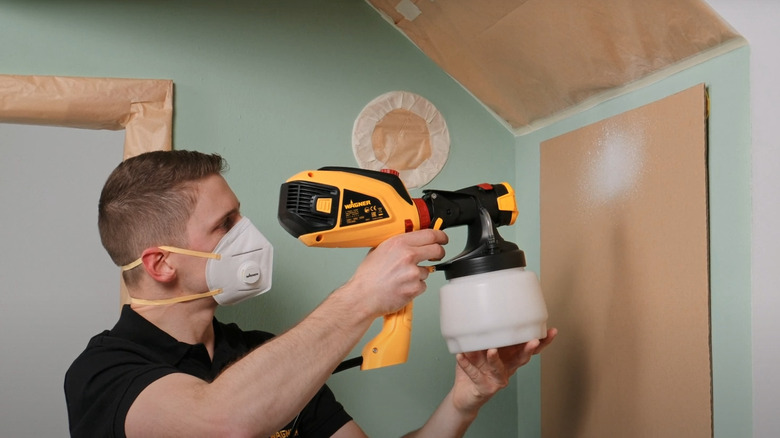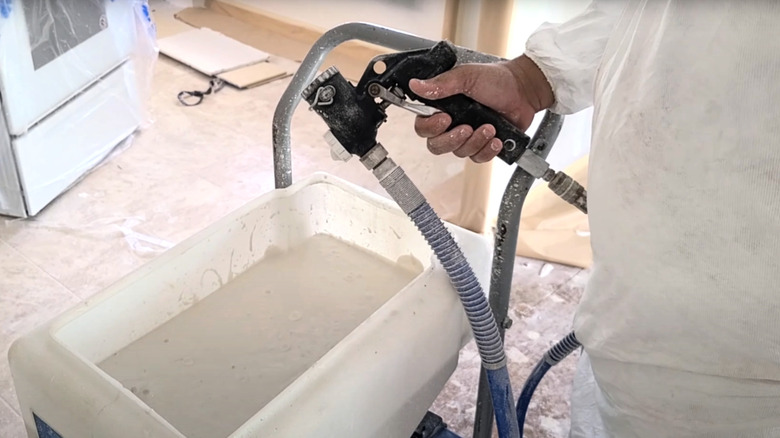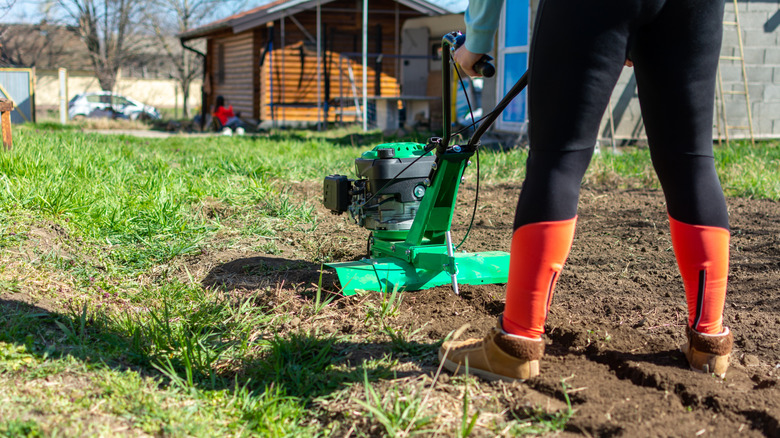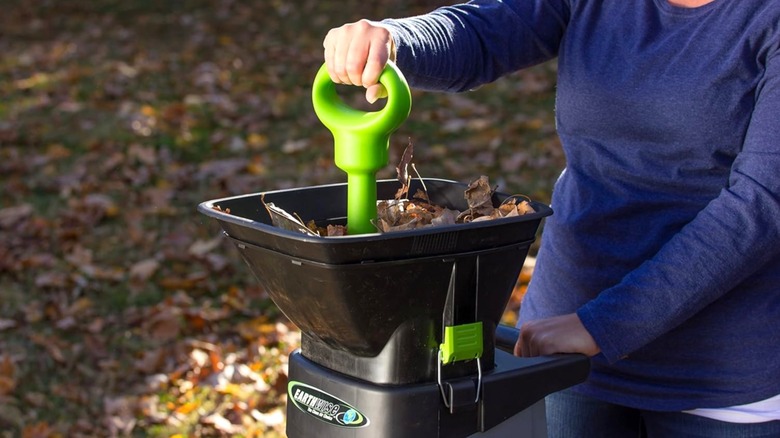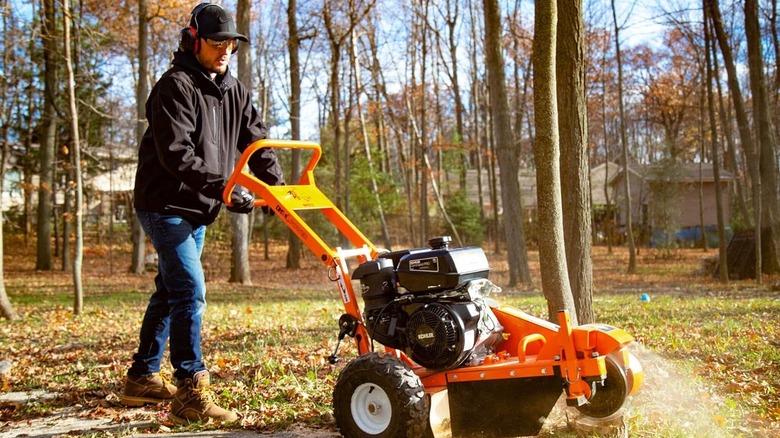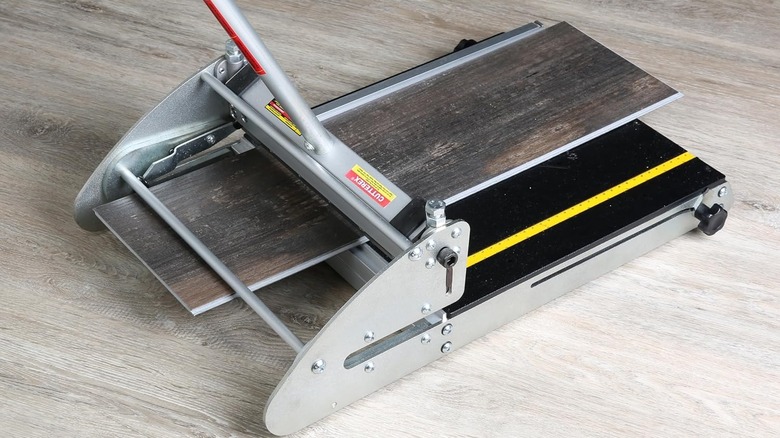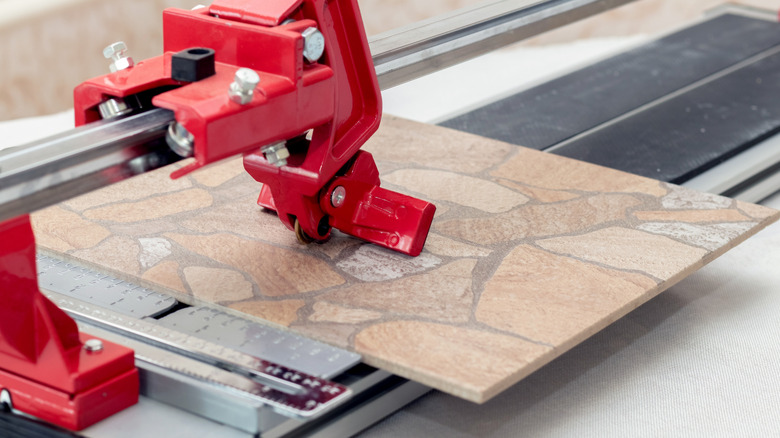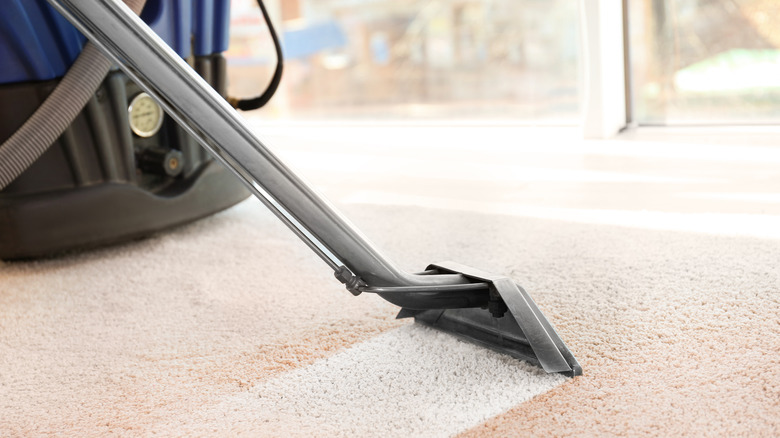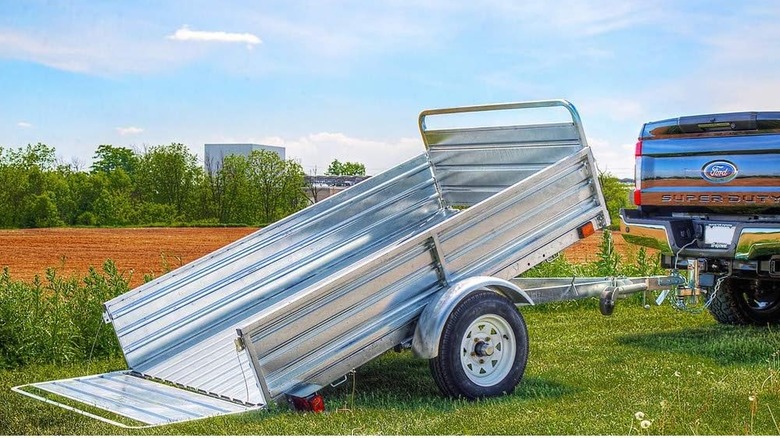Stop Wasting Money And Rent These 9 Tools For Your Next DIY Project
We may receive a commission on purchases made from links.
Large DIY equipment and tools are a hefty investment, but they're quite handy for home improvement projects, landscaping endeavors, and other unique tasks. These specialized tools make work more efficient, precise, and overall easier to complete. The caveat is that most homeowners only need these tools once or a few times a year. Dishing out hundreds to thousands of dollars isn't the smartest financial decision. Instead of wasting money, consider being fiscally responsible and renting a unit to cut your spending by up to 90%.
Below are nine DIY tools that most DIYers are better off renting. These products are specialized for tasks that don't come up often or may have additional hidden costs when purchasing and maintaining them over the years. Purchasing equipment may guarantee it's always on hand, but you'll also need storage space, routine upkeep, and repairs and replacements. Many tools also have limited warranties that put you out a lot of money if accidentally broken or misused.
The point is that renting saves money, only costing around $30 to $110 a day (though prices may vary by location), instead of hundreds to thousands of dollars in purchases. You're getting top-tier equipment for as much time as you need. There are no future costs to worry about until another rental is necessary, which ideally is not for a long time.
Paint sprayers are limited to large-scale or outdoor painting projects
A paint sprayer is key to getting a perfect finish on DIY projects. These tools cover more surface area faster than traditional brushes and rollers, and they're useful for painting entire fences, walls, or large furniture pieces. Although practical for large-scale products, they aren't a wise investment for everyone. Most homeowners only need them for occasional projects. Purchasing isn't necessary unless you plan to start a side hustle of spray painting regularly (if you flip furniture, for example) for extra income.
When faced with the rare occurrence where you need to paint your walls, cabinets, fences, or refurbish a piece of furniture, it's smarter to rent a paint sprayer. Rented professional medium-duty paint sprayers are only abut $100 per day. The rented paint sprayer is also purchasable for a much higher price; the Graco Hi-Boy Airless Paint Sprayer is listed for $1,079. Assuming each potential project takes you a day, you would have to use the paint sprayer about 12 times to justify the purchase. Seeing as most people don't have 12 large-scale paint projects to do around their home, it naturally makes more sense to rent the paint sprayer once or twice a year as needed.
Texture sprayers handle rare but demanding texture finishes
Texture sprayers aren't a well-known tool. They only come up during drywall repairs or custom finishes for pre-existing ceilings or walls. Using sprayers are much faster than hand applications and are preferred for the same reason as paint sprayers. They work faster and apply coats of paintmore evenly. Paint sprayers are used rarely, but texture sprayers are used even less, making them a bulky and unreasonable purchase for the average person.
The Graco TexSpray Texture Sprayer is $2,441 to own. The rental price for the exact same model is only $71 per day. Even if you use the texture sprayer long-term, it's hard to justify such an exorbitant purchase. The rental cost per month is around $850. If rented for two months at the per-month rental price, the cost would still be less than buying the tool outright. Keep in mind that needing it for two months is an outlandish scenario. Most drywall projects are doable in less than a day. At most, it could take a few days if repairing multiple rooms.
Garden tillers prep the soil once per season
Think twice before using a garden tiller to turn your garden. Soil needs to be tilled, at most, once per year to prepare the soil for seeds. Master Gardener and Horticulture Expert Angelo Randaci warned Southern Living, "If tilling is done too often, it can change the soil structure. This can cause soil runoff and erosion." Bearing this in mind, most homeowners don't need a garden tiller to mix up the soil in their yard more than once every few years, especially when a simple rake or pitchfork works on smaller garden spaces. The danger of buying a garden tiller is that you may feel obligated to over-till just to justify the purchase.
Instead of dropping over $1,005 on a Troy-Bilt Bronco Rear Tine Garden Tiller to prepare your own soil, rent an identical piece of equipment for just $85 a day. Most homeowners only need to till once until either their plants die or a garden redesign is in session. Even if they tilled once a year, it would take over 10 years of rentals to equal the cost of buying this tool. Keep in mind that purchased equipment needs to be maintained even when not in use, which increases its lifetime cost. Empty the gas tank or stabilize the tank with a fuel stabilizer when it's out of commission, which is the majority of its lifetime.
Wood chippers are overkill for most yards
If you have a home with a yard and lots of greenery, a wood chipper comes in handy from time to time. After big storms, pruning sessions, and tree removals, homeowners need to hire a professional or find a way to chop up yard debris themselves. A wood chipper makes this chore faster and less tedious, and it creates small wood chips that can be used as ingredients in DIY mulch. Although a wood chipper may seem like a good investment, it's not worth the high purchase price for most people. They aren't used regularly, and most households only need them once or a few times a year.
A 4-inch wood chipper rental is $90 for a day's use. In comparison, a similar model, the DK2 Commerical Gas Powered Chipper, costs $1,749.99 upfront. Unless you have a large property and a lot of woods to maintain, this purchase is likely unnecessary. The purchased version takes some skill to assemble and start up, according to reviewers, which adds some additional complications to buying this equipment. Borrowed equipment comes already assembled and with some wood chipper rental safety tips to keep in mind. Also, consider that an expensive wood chipper is going to need expensive maintenance and replacement parts over time. The $1,749.99 is just a base fee and doesn't account for all the work it'll need over the years. Biomass and Bioenergy published a study on wood chipper repair costs, and at 10,000 hours of use, the total repair cost was estimated to be a whopping 60% of the machine's original price. Bearing these factors in mind, the rental version is the easy choice.
Stump grinders are solely for removing tree stumps after tree removal
Stump grinders are in the same equipment category as wood chippers, and they're useful for DIY landscape work. One of the biggest considerations when using a stump grinder is deciding whether to rent or buy. It's useful for finishing a fallen tree cleanup, so you don't have to pay an exorbitant price for a stump removal company. However, stump removals are rarely necessary, especially on smaller properties with few trees. It's not worth the investment unless you join the tree industry or lend the tool to others. Even landscaping companies outsource stump grinding because it makes more financial sense, and they work on far more properties than the average person.
Renting a stump grinder costs $110 per day. That may be higher than other DIY equipment, but it's still a vast difference from the price of buying a new tool for home projects. The purchasable version of the rentable device, the Power King Gas Powered Stump Grinder, costs $2,069.49. At a price this high, you would need to grind up at least 18 fallen trees on your property just to offset the price of the device itself. This doesn't include additional maintenance costs, such as changing the oil, adding fuel, and replacing machine parts. In fact, stump grinder teeth only last up to 15 hours before needing replacement. Replacement teeth are sold for around $30 each, which quickly adds up.
Floor cutters are only needed for one-time floor renovations
Hard flooring lasts for decades, even when made of budget-friendly laminate or vinyl. When the time comes to replace them, many homeowners opt to do it themselves, since several flooring options are easy to DIY and install. However, some tools are necessary to ensure that new flooring sits flat from wall to wall. A floor cutter helps DIYers cut boards evenly and to precise measurements. It's a must-have for efficient flooring installations, but is also a very niche tool. Hard floors are replaced very sparingly, and floor cutters aren't useful for many other projects, making this an impractical purchase when you can easily rent one instead.
Floor cutters aren't extremely expensive, and the Roberts PrecisionCuts Multi-Floor Cutter is $395 to buy. Given the lower price point, they're even cheaper to rent and only cost $32 per day. Even though they're more budget-friendly than other tools on this list, floor cutters are only worth purchasing if you're redoing many floors or are redoing a large room. Most standard-sized rooms are doable in a day, especially if there are two people working on it. There's no reason to purchase unless you plan to rent for an entire month. In this case, the rental is only $10 less than buying the exact same tool up front, potentially rationalizing the purchase.
Tile cutters aren't used often enough to justify the purchase and upkeep
Tile cutters serve a similar purpose to floor cutters and are just as niche. They help DIYers make clean, precise, and quick cuts through tiles for professional-level finishes. Experienced DIYers and contractors agree on one thing: You need a quality tile cutter, or it's not worth it. The problem is that not all tile cutters have the same capacity, meaning they can't cut through certain sizes or thicknesses. If you're going to buy a tile cutter, it should be one that befits the majority of tiling projects. However, the higher the quality, the higher the price, which makes a rented tile cutter much more appealing
A heavy-duty 10-inch Diamondback Wet Tile Saw goes for $500, making it among expensive tools that's better for renting in DIY projects. A similar 10-inch tile saw rental is only $60 per day, or $242 per week. If you regularly engage in tiling projects, and see yourself working for over two weeks, purchasing may be a better deal at first. However, remember a tile saw is not a standalone purchase. The blades need to be replaced and sharpened every so often. Since tile cutters cut through thick materials, they need top-tier blades, like the $64.19 Dewalt Premium Wet Diamond Blade.
Carpet cleaners do deep cleans once or twice a year
Spot cleaning and vacuuming your carpets only does so much, and the only way to deep clean a carpeted room is to use a carpet cleaner tool. A deep carpet cleaning is only recommended once or twice a year, but it requires specialized equipment. Some homeowners repurpose hard floor steam cleaners to save them the cost of a specialized rental or purchase, but do not follow this money-saving tip. Hard floor steam cleaners release too much water, which turns carpets into dirt magnets and potentially leads to mold growth. The indisputable answer to avoiding these issues is renting the right equipment.
A carpet cleaner is necessary, and it's wiser to rent rather than buy. A new carpet cleaner from the reputable Rug Doctor brand costs upwards of $419. In comparison, a Rug Doctor rental is only $23 per day. Seeing as you only need to deep clean carpets once or twice a year, you would have to use an owned Rug Doctor for essentially a decade to equal the cost of a rental. Of course, this is assuming the device works as designed and doesn't break down or need repairs over years of scant usage.
Utility trailers need lots of space for storage
Utility trailers are useful if you have a large property or often transport heavy objects like boats, recreational vehicles, and bulky tools. Most people only need utility trailers occasionally when moving or transporting a one-time, unique purchase. Trailers are a little expensive to own, but have more considerations on top of the upfront cost. Trailer owners need storage space to keep them. People in smaller homes, apartments, and townhouses, especially ones with strict Homeowner's Associations and no garages, driveways, or outdoor storage spaces, will have nowhere to keep a large trailer. In these instances, a trailer purchase isn't just a one-time cost — people may also have to pay for storage.
A 15 cubic-foot trailer costs $30 to rent for a day. A similar trailer with the same dimensions, the Vevor Trailer Dump Cart, is $316.99 to buy. Unless you're hauling multiple times throughout the year and have a designated storage space available, this isn't a wise purchase. You'll be wasting your money on an unused trailer and have a monthly fee between $15 to $50 a month to store it (though this price may vary depending on your location.)

